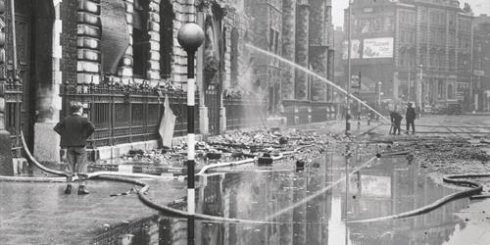The firefighters of Irish heritage during the 9/11 attack on New York were lauded for their courage and resilience. The tragedy drew public attention to the Irish tradition of serving in the New York City Fire Department - to save the lives of others at the risk of their own. It was important to commemorate their action and sacrifice in September 2001.
These men and women were the descendants of immigrants who had fled the potato famine of the 1840s - the Great Hunger - and crossed the ocean in search of a better life. Many found it - as did their Jewish brothers and sisters - in New York. The firefighters of 2001 acted as they did because they were defending their city and helping their fellow citizens.
Over three quarters of a century ago, another community of immigrants rallied to the defence of their city. The Jews of London's East End knew that Hitler's bombs were not only directed at them and their families but at their city and at their neighbours. They served in disproportionate numbers in the broad civil defence movement - and often as firefighters and firewatchers. From the Battle of Britain through the Blitz to the dropping of V1s and V2s in 1944-45, the Jews of Whitechapel and Aldgate confronted the Nazis who had vowed to ignite London and break the will of the people.
British Jews understood only too well the threat of an imminent German invasion, following the retreat from Dunkirk and the onset of the Battle of Britain. The conflict between two major European powers was being transformed into a war of survival for the Jews.British Jews understood only too well the threat of an imminent German invasion, following the retreat from Dunkirk and the onset of the Battle of Britain. The conflict between two major European powers was being transformed into a war of survival for the Jews.
In Germany, Rheinhardt Heydrich's appointee, Dr Franz Six, had been charged with the creation of six einsatzgruppen to be located in London, Manchester, Birmingham, Bristol, and Liverpool to deal - when the Nazis had conquered Britain - with the Jews of England and Wales and one unit either in Edinburgh or in Glasgow, responsible for the Jews of Scotland. A Jewish Chronicle editorial summed up the fear and the determination of British Jews during the summer of 1940.
At this critical hour for mankind, every British Jew resolved that, come what may and whatever the trials in store, they would stand body and soul by Britain, giving all that they have, never despairing, determined that so far as they can achieve it, the crowning disaster of a desolate world under the heel of a cruel and remorseless master shall not be.
The rush to fight Hitler on the Home Front by putting out fires and rescuing the survivors from their destroyed homes was therefore central and not peripheral. It was more than a sudden responsibility. Older Jews - many of whom had immigrated from Russia and Poland - had watched the zeppelins over London during the First World War and bore witness to the destruction that they wreaked. The age of air travel had spawned the war against civilians.
Older Jews who were unable to join the armed forces therefore volunteered for the Fire Service where they could make a contribution to defeating Nazism. Some worked down the (Petticoat) Lane on the stalls, others had their businesses in the area.
According to the 1931 census, 330,000 Jews lived in Britain - of whom about a third lived in London's East End. The rise of homegrown fascism under the leadership of Oswald Mosley persuaded many Jews to join the Communist party because it was viewed as activist and determined to stand up to the acolytes of Hitler. Their Jewishness was often defined by a rejection of anglicisation and assimilation. They did not warm to the luminaries of Anglo-Jewry such as Sir Basil Henriques and Lord Bearstead who advised them to become "Englishmen of the Jewish persuasion".
Following the battle of Cable Street in 1936, the East End of London became a bastion of the Communist Party of Great Britain (CPGB). Indeed it is estimated that approximately 10 per cent of Britons who fought in the international brigades in Spain were Jewish, yet Jews were only just over one half of 1 per cent of the population. The hypnotic embrace of Communism was broken by the Molotov-Ribbentrop pact, but for those who remained in the CPGB, many joined the Fire Service once Hitler had turned against Stalin and invaded the USSR in 1941.
Yet the Fire Service was also a microcosm of British society - and it also reflected antisemitism within Britain. The struggle against Hitler was not perceived generally as a struggle against antisemitism but primarily as one for the security of the country and the freedom of its people. As Chamberlain himself remarked after Kristallnacht: ''No doubt the Jews aren't a lovable people: I don't care about them myself, but that is not sufficient to explain the pogrom."
Some in the Fire Service found a scapegoat in ''foreign Jews'' due to the unemployment, hunger and injustices of the 1930s. Others - particularly those who had seen service in the armed forces - had never met a Jew before and their views were coloured by historic stereotypes. Yet the struggle against Nazism and the common suffering - Hitler's bombs did not distinguish between Jew and non-Jew - bridged the gap.
The firefighters of the Second World War were regarded as neither civilians nor members of the armed forces - and their story, unlike their present-day Irish-American counterparts, has been marginalised and with the passage of time forgotten. The Jewish contribution to their remarkable persistence in standing up to Hitler has also been lost in the mists of time.
A new book by Martin Sugarman reclaims them for the 21st century reader. It documents their bravery and their stories during the Second World War. It reclaims those who perished from the anonymity of the grave and restores them to their rightful place in history.
It is clear that for the author of this work, this is a labour of love. The dedication is all too apparent. This book is therefore above all an act of remembrance.
These Jewish firefighters of yesterday understood the evil of the times and they acted. They did not stand aside. They did not become bystanders.
The mishnaic sage, Hanina ben Dosa, perceived such motivation and such determination 2,000 years ago:
''When one's deeds are even greater than one's knowledge, the knowledge is effective.
But when one's knowledge is greater than one's deeds, the knowledge is futile.''
Martin Sugarman's book, Jewish Participation in the Fire Service in the Second World War, is published by Vallentine Mitchell.




